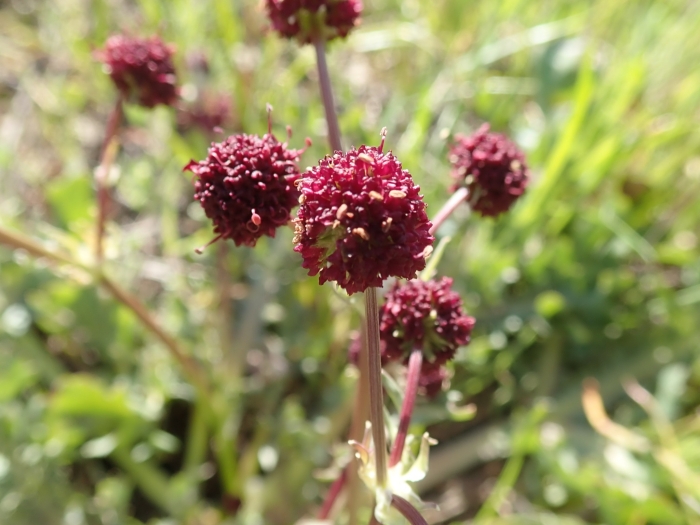Purple Sanicle
(Sanicula bipinnatifida)
Purple Sanicle (Sanicula bipinnatifida)
/
/

joergmlpts
CC BY 4.0
Image By:
joergmlpts
Recorded By:
Copyright:
CC BY 4.0
Copyright Notice:
Photo by: joergmlpts | License Type: CC BY 4.0 | License URL: http://creativecommons.org/licenses/by/4.0/ | Rights Holder: joergmlpts | Publisher: iNaturalist | Date Created: 2021-03-30T16:55:08Z |























Estimated Native Range
Summary
Sanicula bipinnatifida, commonly known as purple sanicle or purple blacksnakeroot, is a perennial herb that is native to a variety of habitats including grasslands, open woodlands, and areas with serpentine soils along the west coast of North America, from British Columbia to Baja California. It typically grows up to 24 inches tall and is characterized by its bright green to dark purple foliage. The plant produces inflorescences composed of tiny reddish, purple, or yellow flowers that bloom in the spring and are moderately showy, attracting various pollinators.
Purple sanicle is valued for its unique foliage color and its ability to thrive in a range of conditions, including poor soils. It is often used in native plant gardens and restoration projects due to its ecological importance, especially in supporting local pollinators. In cultivation, it prefers partial shade to full sun exposure, moderate water, and well-drained soils. While it is adaptable to different soil types, it does particularly well in serpentine soils, which are typically high in heavy metals and low in essential nutrients. This species is listed as endangered in Canada, highlighting its conservation importance. Gardeners should be aware that it may require protection from over-collection and habitat destruction.CC BY-SA 4.0
Purple sanicle is valued for its unique foliage color and its ability to thrive in a range of conditions, including poor soils. It is often used in native plant gardens and restoration projects due to its ecological importance, especially in supporting local pollinators. In cultivation, it prefers partial shade to full sun exposure, moderate water, and well-drained soils. While it is adaptable to different soil types, it does particularly well in serpentine soils, which are typically high in heavy metals and low in essential nutrients. This species is listed as endangered in Canada, highlighting its conservation importance. Gardeners should be aware that it may require protection from over-collection and habitat destruction.CC BY-SA 4.0
Plant Description
- Plant Type: Herb
- Height: 0.5-3 feet
- Width: 1-3 feet
- Growth Rate: Moderate
- Flower Color: Purple, Yellow
- Flowering Season: Spring
- Leaf Retention: Deciduous
Growth Requirements
- Sun: Full Sun, Part Shade
- Water: Medium
- Drainage: Medium
Common Uses
Butterfly Garden, Low Maintenance
Natural Habitat
Native to grasslands, open woodlands, and serpentine soils along the west coast of North America
Other Names
Common Names: Purple Snakeroot, Purple blacksnakeroot, Shoe-Buttons
Scientific Names: , Sanicula bipinnatifida, Sanicula bipinnatifida var. flava, Sanicula deserticola,
GBIF Accepted Name: